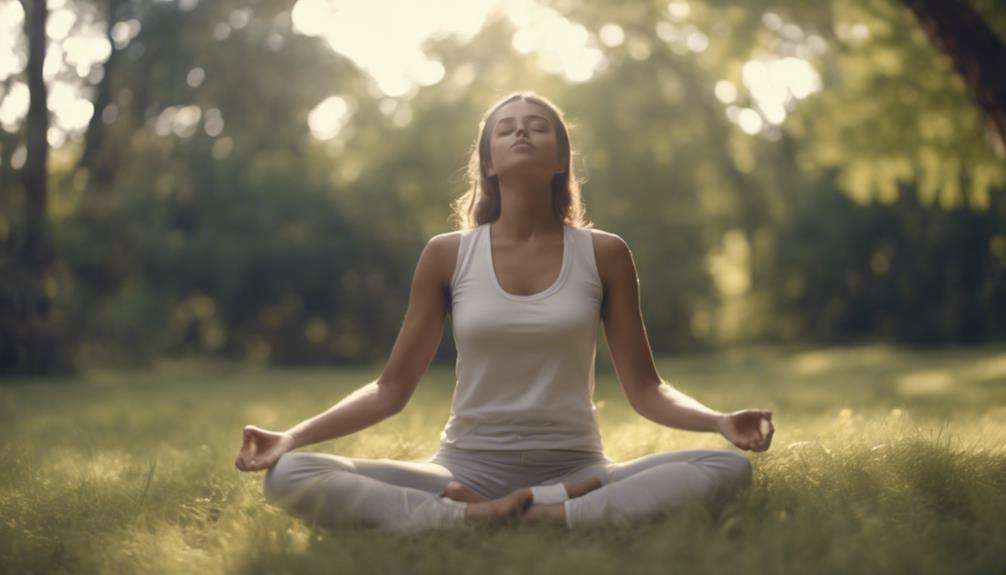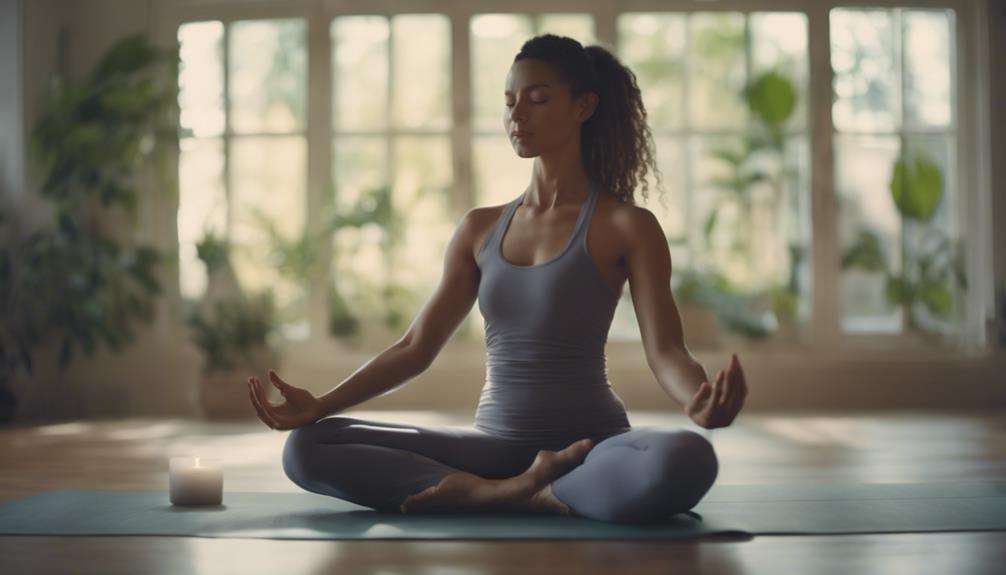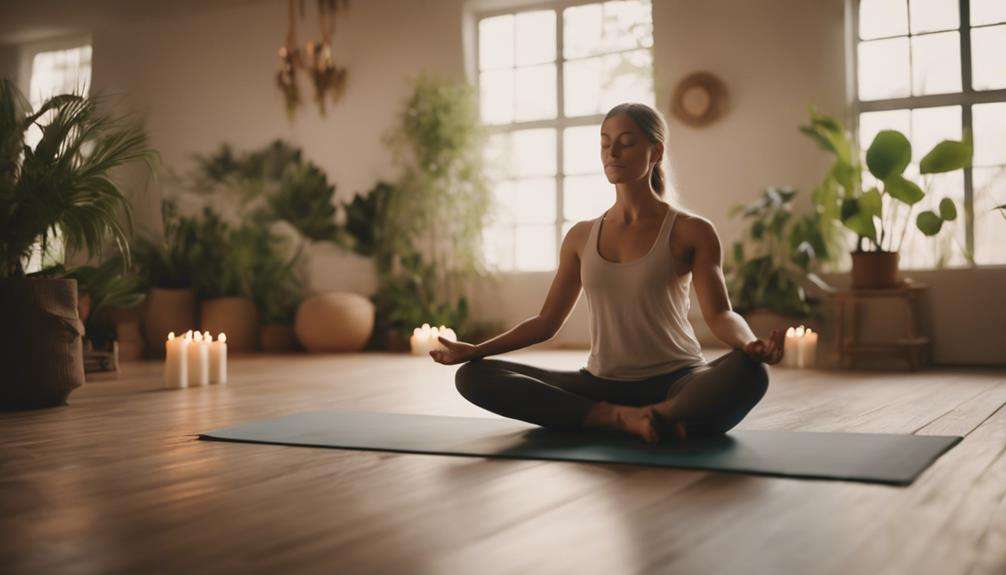When life throws curveballs your way, finding solace in meditation and yoga practices can be your anchor in turbulent times. The ancient wisdom encapsulated in these practices offers a profound avenue for nurturing resilience amidst the chaos of modern living.
By embracing the power of mindfulness and movement, you open a gateway to not just surviving but thriving in the face of adversity. As you delve deeper into these transformative practices, you'll uncover a wellspring of inner strength waiting to be tapped into, guiding you towards a calmer, more resilient version of yourself.
Key Takeaways
- Enhance emotional resilience through mindfulness meditation and yoga practices.
- Reduce stress levels and increase calmness with regular mindfulness meditation.
- Improve stress resilience by incorporating positive habits like daily meditation and yoga.
- Strengthen emotional regulation and face challenges with ease through yoga and meditation integration.
The Power of Mindfulness Meditation
Discover the transformative influence of mindfulness meditation on your mental well-being and emotional resilience. Mindfulness meditation is a powerful tool that can help you enhance your emotional regulation and stress resilience. By actively focusing on the present moment, you can cultivate a greater sense of awareness and control over your emotions. Research has shown that mindfulness meditation reduces symptoms of anxiety and depression by promoting emotional regulation skills. By practicing mindfulness meditation regularly, you can decrease perceived stress levels and increase feelings of calmness and relaxation.
Engaging in mindfulness meditation can also foster self-compassion and acceptance, leading to an overall improvement in your well-being. This practice not only benefits your mental health but also has physical effects on the brain, with regular meditation linked to changes in brain structure associated with emotional regulation and resilience. Embrace mindfulness meditation as a valuable tool in your journey towards better stress resilience and emotional well-being.
Strengthening Resilience Through Yoga Poses
Embrace the practice of yoga poses as a holistic approach to releasing physical tension, improving focus, and enhancing emotional strength for building resilience against life's challenges. Engaging in these physical postures not only benefits your body but also nurtures your mental health and fortifies your inner strength.
Strengthening Resilience Through Yoga Poses:
- Physical Benefits of Yoga: Yoga poses like Child's Pose and Downward Dog help release tension in your muscles, promoting relaxation and reducing physical stress.
- Enhanced Mental Health: Balancing poses such as Tree Pose improve focus and concentration, helping you stay present and resilient against distractions.
- Strength and Resilience: Backbends like Cobra Pose open your heart center, fostering emotional strength and courage to face life's challenges with resilience.
Breathwork Techniques for Stress Relief

When it comes to managing stress, deep breathing can be a powerful tool in your toolkit.
By practicing breathwork techniques like diaphragmatic breathing, you can activate your body's relaxation response and reduce feelings of stress and anxiety.
Take a moment to explore controlled breathing practices in yoga and meditation to help regulate your nervous system and cultivate a sense of calm and well-being.
Deep Breathing Benefits
Deep breathing techniques in meditation and yoga actively engage the parasympathetic nervous system, fostering relaxation and reducing stress levels. Consistent practice offers a range of benefits, aiding in stress resilience and overall well-being.
Here are three ways deep breathing can positively impact your life:
- Lower Blood Pressure: Deep breathing can help reduce hypertension, promoting better cardiovascular health.
- Improved Heart Rate Variability: By enhancing the variation in time between heartbeats, deep breathing supports a healthy heart rhythm.
- Enhanced Oxygen Flow: Deep breathing techniques increase oxygen intake, calming the mind and fostering emotional stability.
Embrace these practices to build resilience and face life's challenges with a sense of calm.
Calm Mind Techniques
Engage in calming breathwork techniques to alleviate stress and cultivate a peaceful state of mind. Incorporating breathwork into your daily routine is a powerful way to enhance mind-body wellness.
By practicing deep breathing exercises, you activate the parasympathetic nervous system, promoting relaxation and reducing stress levels. Mindful breathing not only improves your focus and clarity but also helps regulate emotions in challenging situations.
Controlled breathing patterns found in meditation and yoga can lower cortisol levels, lessening anxiety and fostering inner peace. Regularly engaging in breathwork techniques builds resilience to stressors, allowing you to navigate daily life with a greater sense of calm and balance.
Prioritize your well-being by embracing these simple yet effective practices.
Cultivating Positive Habits for Resilience
Hey there, it's time to focus on cultivating positive habits that can strengthen your resilience.
By incorporating daily practices like meditation and yoga into your routine, you're laying a strong foundation for managing stress.
Embracing these habits will help you foster a positive mindset that can empower you to face life's challenges with a sense of calm and clarity.
Habits for Resilience
Cultivating positive habits through daily meditation and yoga can significantly enhance your resilience to stress and adversity. By incorporating these practices into your routine, you're actively investing in your well-being and mental strength.
Here are three key habits that can help you build resilience:
- Consistent Meditation: Engaging in daily meditation helps calm your mind, reduce anxiety, and improve emotional regulation, laying the foundation for resilience in the face of challenges.
- Yoga Practice: Regularly practicing stress-relieving yoga poses not only reduces physical and mental tension but also cultivates a resilient mindset, enabling you to navigate life's ups and downs with greater ease.
- Affirmations and Self-Care: Incorporating affirmations and self-care routines into your daily life fosters a positive outlook and strengthens your ability to bounce back from adversity.
Positive Mindset Practice
Building a positive mindset through daily practices like meditation and yoga is key to enhancing your resilience to stress and adversity. By incorporating resilience through yoga and mindfulness techniques, you can strengthen your ability to recover from life's challenges with grace and composure.
Embracing positive habits such as deep breathing and gratitude practices empowers you to combat negative thoughts effectively. Remember, cultivating a positive mindset is about finding balance between acknowledging both positive and negative emotions while focusing on optimism and self-compassion.
Through consistent self-care practices and a resilient attitude towards uncertainties, you can navigate stress and anxiety with a sense of inner peace and strength. Stay committed to nurturing your positive mindset, and you'll find yourself better equipped to tackle life's obstacles with resilience and courage.
Yoga Nidra for Deep Relaxation

Induce deep relaxation and promote stress relief with Yoga Nidra, a guided meditation practice known for its ability to calm the mind and body, enhancing overall well-being. Through this practice, you can experience a profound sense of relaxation that helps in reducing stress levels and fostering emotional resilience.
Here are three key benefits of incorporating Yoga Nidra into your routine:
- Anxiety Reduction: By engaging in Yoga Nidra regularly, you can significantly decrease feelings of anxiety and tension, allowing for a more peaceful state of mind.
- Improved Sleep Quality: The deep relaxation induced by Yoga Nidra can lead to better sleep patterns, helping you wake up feeling more refreshed and rejuvenated.
- Enhanced Emotional Resilience: This practice not only aids in stress relief but also strengthens your emotional resilience, enabling you to navigate life's challenges with a greater sense of ease and composure.
Embark on this journey of deep relaxation and inner peace with Yoga Nidra to nurture your well-being and cultivate a calmer, more resilient mind.
Movement Meditation for Stress Resilience
Hey there! Ready to explore how movement meditation can help you build stress resilience?
Let's start by looking at breathwork for calming your mind and incorporating mindful stretching techniques to enhance your practice.
These simple yet powerful techniques can assist you in grounding yourself in the present moment and promoting relaxation.
Let's discover how movement meditation can be a valuable tool in managing stress and boosting your overall well-being.
Breathwork for Calming
When seeking to calm your mind and enhance your stress resilience, incorporating breathwork into your movement meditation practice can be a powerful and effective strategy. Deep, intentional breathing during movement meditation not only helps in calming the mind but also aids in reducing stress levels.
Here are three ways breathwork can enhance your stress resilience:
- Regulating the Nervous System: Breathwork techniques in yoga and meditation play a crucial role in regulating the nervous system, promoting relaxation and reducing anxiety.
- Activating the Parasympathetic Nervous System: Specific breathwork patterns can activate the parasympathetic nervous system, inducing a state of calm and tranquility.
- Improving Mental Clarity: Intentional breathing practices during movement meditation can alleviate anxiety, enhance mental clarity, and improve focus, ultimately boosting overall stress resilience.
Mindful Stretching Techniques
As you explore the practice of mindful stretching techniques in movement meditation for enhancing stress resilience, you'll discover a powerful way to calm your nervous system and promote overall well-being.
Incorporating yoga and meditation into your routine, along with controlled breathing, can significantly reduce tension in your body.
Engaging in movement meditation through stretching not only promotes relaxation but also fosters mental clarity and emotional balance. By connecting your breath with gentle stretches, you can release both physical and mental stress, improving focus and reducing anxiety.
Consistent practice of these mindful stretching techniques strengthens the mind-body connection, helping you build resilience to daily stressors.
Embrace this holistic approach to movement and meditation to enhance your well-being and stress resilience.
Integrating Yoga and Meditation Practices

Integrating yoga and meditation practices into your daily routine can significantly enhance your stress resilience by calming both your mind and body. By committing to these practices, you pave the way for a more balanced and centered life.
Here are three key ways in which integrating yoga and meditation can benefit you:
- Mind-Body Synchronization: Through yoga and meditation, you can cultivate a stronger connection between your mental and physical well-being. This synchronization allows for a more profound sense of calm and clarity, helping you navigate stressors with greater ease.
- Enhanced Emotional Regulation: Regular engagement in yoga and meditation practices equips you with tools to manage your emotions effectively. This heightened emotional awareness enables you to respond to challenges with a grounded and composed demeanor.
- Increased Mental Resilience: The combination of yoga and meditation serves as a shield for your mental health, fostering resilience against the pressures of daily life. By integrating these practices, you build a foundation of strength that empowers you to face stressors with a sense of inner peace and stability.
Emotional Regulation Through Mindfulness
Enhance your emotional well-being through mindfulness practices in yoga and meditation. By incorporating mindfulness into your daily routine, you can improve your emotional regulation and cultivate a greater sense of self-awareness and self-compassion. Mindfulness practices, such as mindful breathing techniques during meditation, can help you manage your emotions effectively by calming your nervous system and reducing stress responses. These practices enable you to become more attuned to your thoughts, feelings, and bodily sensations in the present moment, allowing you to respond to challenging situations with greater ease.
Incorporating specific yoga poses that focus on mindfulness can further enhance your emotional regulation. By engaging in poses that promote mindfulness, you strengthen your prefrontal cortex, a crucial brain region responsible for regulating emotions. Studies have shown that regular mindfulness practice through yoga and meditation can reduce emotional reactivity, leading to improved emotional regulation overall.
Embrace mindfulness practices in your yoga and meditation sessions to foster emotional balance and resilience in your daily life.
Enhancing Resilience With Restorative Yoga

Discover the restorative power of yoga through gentle poses that promote deep relaxation and healing, enhancing your resilience to daily challenges. Restorative yoga offers a sanctuary where you can release physical tension, calm the mind, and foster emotional balance.
Here are three ways this practice can help you build resilience in both your physical and mental well-being:
- Calm Your Nervous System: By holding gentle poses for extended periods, restorative yoga helps calm your nervous system, reducing stress levels and promoting a sense of inner peace.
- Build Emotional Balance: Through mindfulness, deep breathing, and inner reflection, restorative yoga encourages emotional balance, allowing you to navigate daily challenges with a clearer mind and a more stable emotional state.
- Enhance Overall Well-being: Incorporating restorative yoga into your routine can improve sleep quality, boost immune function, and support your overall well-being, enabling you to face each day with renewed strength and resilience.
Embrace the practice of restorative yoga to nurture your body and mind, and enhance your resilience for the daily journey ahead.
Creating a Daily Meditation Routine
As you look to cultivate inner peace and resilience in your daily life, consider incorporating a consistent meditation routine to nurture your mental well-being and enhance emotional regulation.
Meditation provides a powerful tool for managing stress and anxiety by allowing you to center yourself and find a sense of calm amidst life's challenges. By dedicating just 10-15 minutes each day to meditation, you can improve your ability to adapt to stressful situations and enhance your overall well-being.
Regular exercise for your mind, meditation can help you build resilience against the pressures of daily life. Research shows that a daily meditation practice can boost your focus, attention span, and mental clarity, leading to increased self-awareness and emotional intelligence.
Frequently Asked Questions
How Does Yoga Increase Resilience?
You increase resilience through yoga by nurturing the mind-body connection, managing stress effectively, and regulating emotions. Yoga empowers you to face challenges with strength and grace, fostering a sense of inner peace and balance.
How Can I Improve My Resilience to Stress?
You can improve stress resilience by managing stress through techniques like deep breathing and yoga. Build resilience with mindfulness practices and strategies that enhance emotional strength. Remember, a little self-care goes a long way in staying calm amidst life's challenges.
How Yoga and Meditation Help to Cope up With Stress and Emotions?
When you practice yoga and meditation, you develop a strong mind-body connection, heighten breath awareness, and improve emotional regulation. These practices empower you to face stress and emotions with resilience and inner balance.
How Does Meditation Improve Resilience?
Meditation improves resilience by strengthening your mind-body connection, enhancing stress management. It fosters focus and clarity, aiding in emotional regulation. Regular practice builds resilience through self-care practices, empowering you to navigate challenges with greater ease and grace.
Conclusion
As you continue on your journey of self-discovery through meditation and yoga, remember that you're like a resilient tree, swaying with the winds of life but firmly rooted in your inner strength.
Embrace the power of mindfulness and breathwork to weather any storm that comes your way. With each yoga pose and moment of stillness, you're cultivating a garden of peace within yourself.
Keep nurturing this inner oasis, and watch your resilience blossom and grow. You're capable of overcoming any challenge that comes your way.






